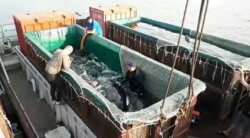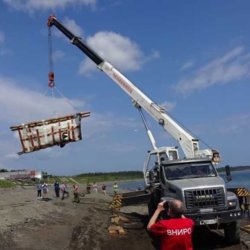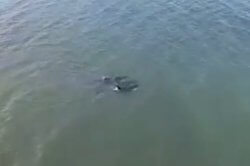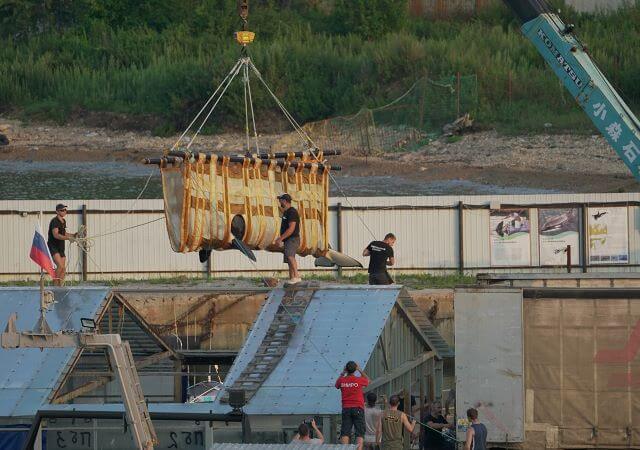Friday, August 2nd, 2019
Russian authorities have begun the transport of a third group of orcas from the “whale jail” on Russia’s Far East coast to the Sea of Okhotsk, where they will be released into the ocean.
In response to widespread criticism of the lack of transparency during and after the first two releases, the government has invited Greenpeace Russia to observe much (but not all) of this third release. Greenpeace, in turn, has asked the Whale Sanctuary Project to provide recommendations on how to conduct its mission most effectively. (A summary of our recommendations is at the end of this post.)
The lack of transparency has understandably led to a lot of rumor and speculation. So, here is our best understanding of the events of the past month, of the next steps in the government’s plan to return all 10 orcas and 87 belugas to the ocean by this coming fall, and of the Whale Sanctuary Project’s possible participation in future releases.
First, an update on what led to the decision to return the whales to the ocean.
Our visit to the “whale jail” and report to the Russian government
The cetaceans being held at the “whale jail” were captured illegally in the summer of 2018 by a consortium of Russian companies for the purpose of selling them to marine entertainment parks, mainly in China. But in response to global outrage when news broke about the plan, the Russian government intervened.
In April of this year, following our letter to President Vladimir Putin, the Minister of Natural Resources and Environment invited Jean-Michel Cousteau and the Whale Sanctuary Project (WSP) to bring a team to Russia to assess the condition of the whales and to advise the government on a rehabilitation program with a view to their being returned to ocean waters.

Jean-Michel Cousteau (left), Gov. Oleg Kozhemyako and Charles Vinick at signing ceremony in Vladivostok.
After Cousteau and Charles Vinick, Executive Director of WSP, signed an agreement with the Governor of Primorsky region that the whales should be “released back into their natural environment,” we studied the whales in their sea pens in Srednyaya Bay and then submitted our assessment to the Ministry and to the Russian Federal Research Institute of Fisheries and Oceanography (VNIRO), along with recommendations for rehabilitating the whales and then returning them to the ocean .
The Russian government accepted a number of our most important recommendations, including that the whales should be returned to ocean waters close to where they were captured and not into Srednyaya Bay where they were being held. However, the government did not accept all our recommendations – for example, that all of the animals should spend some time in a sea pen at their place of release to be sure that they were sufficiently re-adapted to life in the ocean.
On June 20th, during his annual “Direct Line” televised phone-in with the Russian people, President Putin announced that Russia was beginning the process of returning the whales to the ocean. (Deputy Prime Minister Alexei Gordeyev added that the government would change the law in order to ban hunting whales for “educational and cultural purposes” – a loophole in Russian law used to capture these whales.)
First and second releases
The Russian government contracted with the same companies that had originally captured the whales to transport them to the location of their release.
The first release included two orcas and six beluga whales and involved an 1,100-mile, six-day truck journey to Nikolaevsk on the Amur River for release in the Sea of Okhotsk, close to where they were captured last year.
The transport encountered a severe storm and the operation overall led us to raise serious questions about how it had been conducted.
Three weeks later, three more orcas were transported and released in what was reported to be a considerably smoother operation.



Photos supplied by the VNIRO Institute which is overseeing the release on behalf of the Russian government.
Among the positive observations was when two of the orcas – a male and a young female – were lowered into the ocean around Cape Perovskogo in the Sea of Okhotsk. The two remained in the release area, rather than heading straight out to sea, until the third orca, an older female, was lowered into the ocean. She hurried to join the other two, and all three headed out to sea together.
A few days later, however, the crew of a fishing boat reported that an orca had approached their boat and that they had hand-fed her some fish. A photo they’d taken confirmed that she was the younger female, known as Aleksandra. Fortunately, Aleksandra did not continue to look for more food from the fishing boat, and subsequent reports are that she has moved further out to sea where other whales are reported to be.
The third release
On July 30th, the VNIRO Institute announced the launch of a third transport and release that would include three orcas: a large female, a male and a young female.

One of the orcas is loaded onto a ship for transport to the release site. Photo by Greenpeace.
VNIRO added that these three orcas have lived in the same enclosure and represent an established social group; that although they do not appear to be members of the same family, they have developed a stable team relationship whose leader is the larger female; and that the younger female is reportedly about six years old, has a calm and sociable nature and relates well to the other two orcas.
Russian scientists are hopeful that “such a composition of the group increases the chances of a successful return of orcas to their natural habitat, a possible connection with a family of wild relatives or the formation of their own family.”
Russian authorities have invited Greenpeace Russia to observe the release and report on it. Greenpeace, in turn, has asked the Whale Sanctuary Project for input on specifics as to what should be noted during their observations. Our recommendations to Greenpeace include:
- what kinds of videos and photos should be taken before, during and after the transport/release;
- what to observe regarding feeding and hydration of the orcas;
- how they are placed into slings for transfer into and out of their transport crates;
- frequency of changing the water in the crates;
- frequency and type of massages during transport to help exercise their muscles;
- how to listen for unusual vocalizations;
- whether they are able to spend time in a sea pen to acclimate themselves prior to release into the open ocean;
- how long the whales are being followed (preferably up to 48 hours) and by whom.
Will the Whale Sanctuary Project conduct independent observation of future releases?
The VNIRO Institute continues to be in regular contact with the Whale Sanctuary Project team, and we are in ongoing discussions with them about all the concerns that have been raised in the media and elsewhere regarding the releases so far.
For example, while satellite tags attached to each whale can provide daily updates on their locations (although at least one tag is not functioning), more comprehensive monitoring protocols and equipment are needed if we are to know how the released animals are doing and what can be learned for future releases so that the whales are given the best possible chances for success in their return to the wild.
Charles Vinick is also discussing with VNIRO the need for an independent team of observers to monitor the transport/release program, how such a team would operate, and how members of the Whale Sanctuary Project team can provide the most added value to this work.
2 Comments
My wife and I have just watched your documentary Born to be Wild and I must say we were saddened to think history was repeating itself in China. For years we have both been following the battle with SeaWorld to stop its barbaric keeping captive Orcas and all the progress made over the last decade… To think there are wild Orcas now being captured by Russia to be sold to China and start another enterprise there deeply saddened us. The thought of more young whales being subjected to decades of torture and torment after coming this close to stopping it at SeaWorld is devastating…
I immediately went to your website and read this article and it’s so uplifting to hear that Putin has started releasing some of the whales recently captured. I just hope the world starts to listen and follows suit.
The idea for a whale sanctuary is fantastic, to see whales that have spent the majority if not all their lives in a fish tank swimming in your ocean sanctuary would be incredible! We wish you all the best of luck in making this a reality.
We will follow your progress closely.
I’m one of the millions of people who went to the shamu stadium as a child, and intend to see orcas again but this time I will take my children so they can see them in the wild where they belong!!
We are WASP. We are watching. We are supportive. http://www.oceanoutfallgroup.com